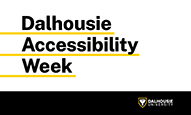Hurricanes, heat domes, extreme flooding, and other hazards and disasters exacerbated by climate change can turn people’s lives upside down. Imagine facing such situations while living with a disability.
That’s exactly what aims to do with her research.
“Climate change amplifies pre-existing inequities, so people with disabilities are more likely to be harmed by extreme heat, by storms, flooding, service disruptions”, says Norris, a PhD candidate in Health at Dal, noting that the social isolation and poverty many people with disabilities face increase these risks.
Norris, who lives with an acquired brain injury, has experienced many severe weather events such as the heat dome that formed over British Columbia in Summer 2021 and flooding in Halifax in 2023, when her home was severely damaged.
Her personal experience, as well as decades spent in social work working with low-income and disabled community members, propelled her to pursue doctoral research looking at the structural barriers that vulnerable communities experience in the face of climate change. She’s particularly interested in whether governments are doing enough to plan for how those living with disabilities are impacted.
“I wanted to move a little bit upstream and look at the systems themselves, like the policies, the assumptions and the gaps that create these inequities in the first place” says Norris.
Norris will beĚýĚýthis Thursday (Nov. 27) as part of aĚýDalhousie Accessibility WeekĚýpanel surveying disability research at the university.
 Dalhousie Accessibility Week was created to help build knowledge and momentum around accessibility planning at the university.
Dalhousie Accessibility Week was created to help build knowledge and momentum around accessibility planning at the university.
When systems fail
Norris has found that disability inclusion in climate policy has been sparse and that the language itself used in such regulations and legislation can also be problematic.
“All these documents talk about vulnerable populations, but they don’t get at why they are vulnerable to begin with,” she says. “It is not that they are inherently vulnerable, but that the systems make them vulnerable.”
All these documents talk about vulnerable populations, but they don’t get at why they are vulnerable to begin with.
Nakita Sekhon, a counselling intern living in Victoria, B.C. who lives with a disability, has experienced this first-hand. Sekhon and Norris studied together at the University of Victoria and helped support the disability community there.
One day during a snowstorm, the city shut down the accessible transport service unexpectedly, leaving Sekhon and her toddler without a dependable way to get home. Sekhon would like to see is the creation of more dependable accessible public transport systems that can handle both extreme heat and snow events.
“Our city's infrastructure is not set up for snow and nor is it set up for heat, and so they haven't thought long term on what these changes are going to mean to basic programs,” says Sekhon.
Sekhon has participated in government-led roundtable meetings to hear concerns from people with disabilities but admits to being somewhat more pessimistic about their impact.
“As an individual with a disability, I have stopped giving input into these processes because it ends up being emotional labour on my end that results in no change,” says Sekhon.
Policy shifts emerging
But change is happening, even if it’s slow. Norris found that despite on-going barriers for people with disabilities, there have been some positive changes to climate change policy.
Nova Scotia, the province with the largest percentage of people living with disabilities, has introduced a couple of promising programs in recent years.
One is the , a five-year, legally binding agreement released in 2023 to help the government transform the disability support system in the province to address discrimination.
Another is the , run in part by the province-funded Healthy Minds Cooperative. Since 2024, the program has offered safe, supportive online spaces for people to share how climate change affects them.
Norris says the Climate Cafes serves as a great opportunity to discuss hope in the face of challenge and barriers.
“Hope doesn’t mean pretending that climate change isn’t real or minimizing the devastation or trauma,” she says. “It’s about recognizing the uncertainty of the future but also making a commitment to try to participate in shaping it.”
Research driving inclusion
In addition ot her doctoral research at Dal, Norris contributes toĚý based at McGill University. The team has an intersectional focus, co-creating and sharing research across diverse disability communities, including Indigenous and queer communities, and highlighting climate governance wins like .Ěý
Norris says she'll use this week's panel discussion at Dal as an opportunity to emphasize that people with disabilities are wisdom bearers, a concept she learned from her doctoral supervisor Dr. Judy MacDonald, director of the School of Social Work and assistant dean, equity inclusion in the Faculty of Health.
“Not looking at disability as a lack but looking at what people with disabilities bring to our community as well and [asking] what wisdom and leadership about surviving complexity and challenge they bring,” she says.

